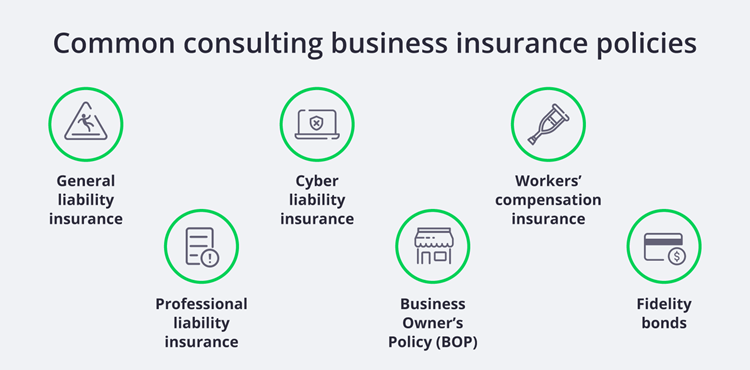Business insurance policies every consultant should consider

Running a consulting business can be incredibly rewarding, both personally and financially. Today, consultants market their expertise across a wide range of industries, from education consulting to IT consulting.
No matter your specialty, all business consultants share a range of risks along with many rewards. That’s why you need to consider small business insurance coverage to help keep you protected.
Let’s look at the top consulting business insurance policies that can safeguard your firm from common risks.

1. General liability insurance
General liability insurance is one of the most important insurance policies for a consulting company. It covers your business in the event of a third-party liability claim related to:
- Client bodily injury
- Client property damage
- Advertising injuries, like copyright infringement or defamation
Consultants regularly meet with clients in their own offices, as well as at their clients’ businesses – which puts them at greater risk for lawsuits over accidental injury or property damage.
If your consulting business is sued, your general liability insurance policy will pay for your legal defense, a settlement with the other party, or any court-ordered judgments to cover a loss.
How much it costs
The average cost of general liability insurance for a consulting business is about $29 per month. This can vary based on your insurance requirements set forth by your state or licensing board, the types of consultant services offered, and other insurance plan factors.
How it can help
For example, imagine that a marketing consultant holds a business meeting in their office, and their client slips on a wet floor and breaks a bone while walking to the conference room. In this case, general liability insurance would cover the client’s medical bills.
Because a general liability policy provides protection for the client, it's a common requirement in client contracts. General liability coverage may also be required as part of a mortgage or lease for a commercial office space.

2. Professional liability insurance
Professional liability insurance, also referred to as errors and omissions insurance (E&O), protects your business against client lawsuits alleging financial harm due to unsatisfactory work or poor advice.
Any business that offers professional services should consider a professional liability policy. Businesses like consulting firms are at greater risk of being accused of a costly mistake, oversight, or negligence. Even if you’re not at fault, professional liability coverage can protect you.
Some common examples of professional liability insurance claims include:
- Work mistakes
- Overspending
- Undelivered services
- Missed deadlines
- Claims of negligence
A professional liability policy is an important part of risk management for consultants. If your business gets sued by a client, this coverage will pay for your lawyer fees, court costs, and any settlements or judgments.
How much it costs
The average cost of professional liability insurance for a consulting business is $55 per month.
How it can help
For example, let’s say an IT consultant is hired to help a client evaluate and improve their cybersecurity measures, but the client suffers a data breach several months later. The client sues the consulting firm, claiming their mistakes led to the breach. In this case, technology professional liability insurance, also called tech E&O, which combines a professional liability policy with third-party cyber liability insurance, would cover the cost of the lawsuit.
Professional liability insurance also provides peace of mind for your clients. Because of that, many companies require their consultants to carry professional liability insurance before signing a contract.

3. Business owner's policy
A business owners’ policy (BOP) is a bundle that includes two separate insurance policies:
While general liability insurance protects against third-party liability lawsuits, commercial property insurance pays to repair or replace damaged and stolen business property. It covers physical office spaces and storefronts, as well as equipment, inventory, and electronics.
However, not all consulting businesses will qualify for a BOP. This policy is generally available to businesses that:
- Have fewer than 100 employees
- Have a small office or workplace
- Make less than $1 million in annual revenue
- Operate in a low-risk industry
- Need less than one year of business interruption insurance
If you’re thinking about getting a BOP for your consulting firm, speak to an insurance agent and find out if you qualify.
How much it costs
Purchasing a business owner’s policy typically costs less than buying general liability and commercial property insurance separately. The average cost of a BOP for a consulting business is $42 per month.

4. Workers' compensation insurance
Workers’ compensation insurance covers medical expenses and lost wages if an employee suffers a work-related illness or injury. It’s required in nearly every state for businesses with one or more employees. Independent consultants should also consider a workers' comp policy to protect themselves in the event of an injury.
How much it costs
The average cost of workers' comp insurance for a consulting company is $40 per month. However, your premium depends on factors like the number of employees you have and the amount of risk your employees face on the job.
How it can help
For example, imagine that an employee at a management consulting firm trips on a power cord in the office and injures their knee. The firm’s workers’ compensation insurance would cover the employee’s lost wages for the time they are unable to work, as well as the cost of their medical bills, like X-rays and physical therapy.
In addition to paying an employee’s medical bills and partial lost wages, most policies also include employer’s liability insurance to protect your business if an injured worker files a lawsuit against you for not preventing a workers’ comp injury.
Using the example above, now let’s say that the injured employee decides to sue their employer for unsafe working conditions. In this case, the employer’s liability insurance portion of the firm’s workers’ comp policy would cover their legal fees and attorney costs.

5. Cyber insurance
Cyber insurance is important for many types of consulting companies, and there are two different types of this insurance. Depending on the nature of your business, you may need both.
First-party cyber liability insurance covers data breaches and other cyber incidents that affect your business’s systems or network. It pays for expenses such as:
- Notifying clients of the breach
- Credit monitoring services for affected clients
- Cyber extortion demands
- Public relations and reputation management services
Third-party cyber liability insurance legally protects your business if your client suffers a breach and files suit against you. It will cover costs such as:
- Attorney fees
- Court and legal costs
- Settlements or judgments
Consultants that handle sensitive data, or advise clients on IT systems or cybersecurity, are most in need of this coverage.
How much it costs
Cyber insurance costs can be a bit expensive. The average premium is $92 per month. But keep in mind that your rate will depend on a number of factors, such as the amount of sensitive information your firm handles and the type of work you do.
How it can help
Here’s a hypothetical situation where cyber liability insurance would come in handy. Say that a research consultant is hired to analyze a client’s sensitive data. The consulting firm suffers a cyberattack, and the client’s data on their servers is breached. In this case, the firm’s cyber insurance would cover the damages.

6. Commercial auto insurance
Commercial auto insurance is a must-have if you have company-owned vehicles. Personal auto insurance will not cover accidents or incidents that occur in vehicles owned by a business.
An auto policy will help you pay for vehicle repairs, medical expenses, and legal costs if you or one of your employees are in an accident. Auto insurance is required in most states. The amount of coverage you'll need to carry will depend on your state and industry requirements.
Failing to carry a commercial auto insurance policy can result in fines, license suspension, loss of vehicle registration, impound, and other consequences, depending on your state.
Additionally, if you use leased, rented, or personal vehicles for company tasks and errands, you'll need a separate policy called a hired and non-owned auto (HNOA) policy.
How it can help
Say, for example, you're driving from your consulting office to a client's workplace using a company-owned vehicle, and you get rear-ended by another motorist. Your commercial auto policy would cover medical expenses and repairs if the other driver happens to not be insured.
How much it costs
The cost of commercial auto insurance depends on factors such as your industry, coverage limits, and types of vehicles. Small business owners pay an average of $146 per month.
7. Fidelity bond
Fidelity bonds offer protection if your employee steals from you or your client. It provides coverage against:
- Theft
- Fraud
- Embezzlement
- Unlawful data access
There are two types of fidelity bonds: first-party and third-party.
First-party fidelity bonds protect your consulting firm from the actions of dishonest employees. This bond will cover expenses related to:
- An employee who steals or embezzles money from your company
- An employee who commits fraud against your company
- An employee who commits forgery that affects your company
Third-party fidelity bonds protect your clients if one of your employees commits a crime against their business. It will cover the fallout related to:
- An employee who steals from one of your clients
- An employee who commits fraud against one of your clients
- An employee who commits forgery against one of your clients
How it can help
Here’s a quick example. Imagine that an employee of your market research consulting firm transfers funds from a client without their consent. The client finds out that your employee illegally moved the money, and they sue your business for their losses. In this situation, a fidelity bond would cover the cost of reimbursing your client for the theft.
Although fidelity bonds are often grouped with insurance policies, they aren’t the same thing. Your business must repay the insurance company for any payments made under a claim with fidelity bonds.
So, if your fidelity bond provider reimbursed your firm for $2,000 following an employee theft, you would be expected to repay the insurer the full $2,000 down the line.
How much it costs
The cost of fidelity bonds depends on a variety of factors, but primarily the size of the bond.

Get the right consulting insurance coverage with Insureon
If you own a consulting company, having the right types of insurance coverage is essential. It protects your company against costly liability lawsuits that can impact your consulting firm financially.
Complete Insureon’s easy online application today to compare quotes for business insurance from top-rated U.S. carriers.
Contact one of our licensed insurance agents if you have any questions about the best types of business insurance for your needs, including other important coverage options.
Once you decide on the right policies for your small business needs and budget, you can submit your payment and receive your certificate of insurance. Most small business owners begin their business consultant insurance coverage in less than 24 hours.
Elizabeth Rivelli, Contributing Writer
Elizabeth is a freelance writer with extensive experience covering commercial insurance and personal insurance lines. Her work has been featured in dozens of online finance publications, including Forbes, Bankrate, and Investopedia. Elizabeth also writes for several insurance carriers.










